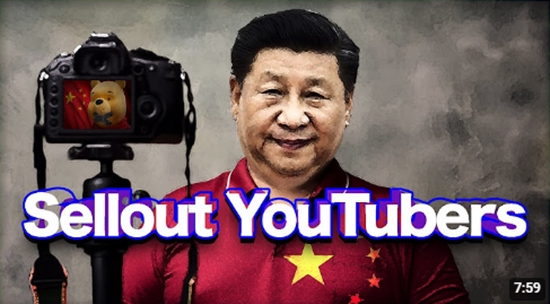
China “reportedly wants to diminish negative narratives about its control of the region” of Xinjiang, control that includes a genocidal assault on the Uyghurs and others.
The qualifying word “reportedly” seems unnecessary. The Chinese government wants to “diminish negative narratives” about all of the bad things that the Chinese government is doing (“China pays Taiwan influencers to film positive videos in Xinjiang,” Taiwan News, September 5, 2024).
Taiwanese YouTuber Potter King revealed in June that China had invited influencers to travel and film videos in Xinjiang, per Radio Free Asia. A second group of internet celebrities is reportedly set to travel to Xinjiang to tout its local environment and public security….
Potter King said YouTubers with tens of thousands of subscribers were targeted for recruitment. In the videos, they said positive things such as “the people in Xinjiang are friendly” and “it is safe to come here.”
Taiwanese YouTuber Ariel, who has 1.1 million subscribers from her travel videos, denied being invited by China. She said her trip was planned six months ago as a casual vacation with friends, and that she did not make money off the videos she posted.
Nevertheless, netizens on Threads criticized the influencers, saying China’s hospitality was an attempt to conceal facts about its repression of minority groups in Xinjiang.
A few years ago, The New York Times reported on “How Beijing Influences the Influencers.”
“According to government documents and the creators themselves,” the Chinese government organizes and funds the travel of pro-Beijing influencers. “State-run news outlets and local governments…have paid or offered to pay the creators. They have generated lucrative traffic for the influencers by sharing videos with millions of followers on YouTube, Twitter and Facebook.”
Most of the YouTubers have lived in China for years and say their aim is to counter the West’s increasingly negative perceptions of the country. They decide what goes into their videos, they say, not the Communist Party.
But even if the creators do not see themselves as propaganda tools, Beijing is using them that way.
One of the Times’s examples is Raz Gal-Or, who “started making funny videos when he was a college student in Beijing.”
Now, the young Israeli brings his millions of subscribers along as he interviews both ordinary people and fellow expatriates about their lives in China.
In a video this spring, Mr. Gal-Or visits cotton fields in Xinjiang to counter allegations of forced labor in the region.
“It’s totally normal here,” he declares after enjoying kebabs with some workers. “People are nice, doing their job, living their life.”
His videos do not mention the internal government documents, firsthand testimonials and visits by journalists that indicate that the Chinese authorities have held hundreds of thousands of Xinjiang’s Muslims in re-education camps.
They also do not mention his and his family’s business ties to the Chinese state…
In effect, Beijing is using platforms like Twitter and YouTube, which the government blocks inside China to prevent the uncontrolled spread of information, as propaganda megaphones for the wider world.
“China is the new super-abuser that has arrived in global social media,” said Eric Liu, a former content moderator for Chinese social media. “The goal is not to win, but to cause chaos and suspicion until there is no real truth.”
In a more recent piece, “Why Chinese Propaganda Loves Foreign Travel Bloggers” (August 31, 2024), the Times explains that videos by influencers reporting on trips to China “have been widely promoted on Chinese media—if they tell a certain story…. The bloggers themselves sometimes feed the official Chinese argument, with video titles such as ‘The Media Lied to EVERYONE about China? We Share the TRUTH.’ ”
Not all the video documentarians skip past any negative-narrative-warranting fact. The report mentions one regular visitor to Tibet who showed more than charming vistas.
In the Tibet video, she praised the scenery and temples. But, she added, “While I try to travel without the bias that the media might have shown me in the past, it was hard to ignore some of the obvious signs of confirmation that were before me,” while showing footage of her seventh security checkpoint that day.
“Without the bias” means what, exactly? Without alertness to signs of established facts about how the Chinese Communist Party treats Tibetans, signs that the Party tries to conceal from prospective influencer-propagandists? At least this particular influencer was willing to report a disturbing detail about life in the trampled region of China she was visiting when it hit her over the head.





